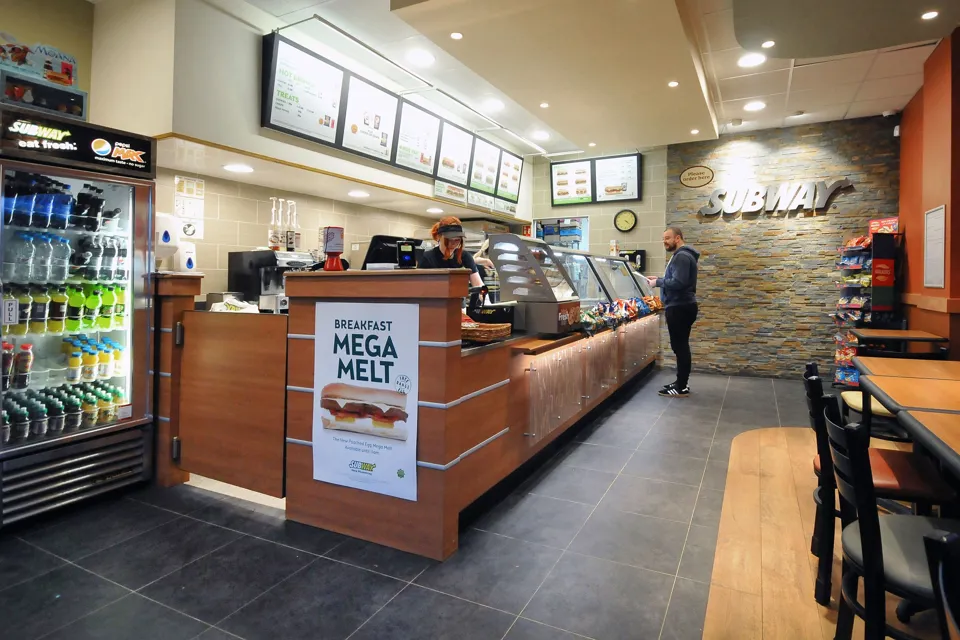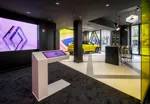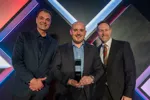Jennings Group, Subway at Stockton Kia: ‘It’s not about making big profits. It pulls people in’
Nas Khan, managing director of Jennings Motor Group, always has an eye on how his business can diversify and is continually looking for opportunities to attract customers to his dealerships’ locations.
Khan said: “In this digital age, we need to be giving customers more reasons to come to the showroom.”
Jennings built a garden centre business opposite its Ford dealership in 1989 to attract more people to the area.
He said: “We ended up renting it out in 1990 and then selling it in 1996 as it was taking up too much time to run, but it still acts as a great pull to bring customers in, particularly on weekends and during occasions like Easter Holidays.”
More recently, when Khan was planning a new Kia dealership, he decided to include a Subway franchise in a unit next to its service department.
Khan said: “I initially looked at Costa or Starbucks, but the set-up costs were eye-watering.
“Subway works because lunch breaks are not what they used to be. No one really has time to have a sit-down meal. Subway is somewhere you can just grab something and go.”
Khan said the set-up costs were about £123,000, but that did not include the unit it is housed in. It took about five months for the building work and fitting-out work to be completed before opening in February 2016.
Subway did have the area down as an open point and it was predicted to make about £3,000 a week. Khan said it is currently taking £7,000 a week. He said the business is profitable and is on a ‘rolling contract’ to continue the franchise.
However, Khan said making big profits isn’t the draw: “We have a lot of dealerships in this area and there is nowhere to get food. Every business in this area and all of their customers will come to us to get something to eat.
“Between 11am and 3pm we will have a queue leading out to my used stock forecourt. People wander around the forecourt and showroom while they’re waiting. It pulls people in.”
While Kia was a little apprehensive about the idea at first, he said it is now “delighted”.
“We’ve been running this Kia showroom for three-and-a-half years and we have gone from retailing 400 cars a year to 700. I’m not saying all of that is down to Subway, as Kia is a brand on the up, but it has definitely had a knock-on effect.”
Part of the appeal of the Subway franchise was the simplicity with how it is run. This means it does not draw too much focus away from Jennings’ core business.
Khan said: “The accounts are automated, the stock take and ordering is all automated. It’s quite hi-tech. We make all the salads fresh, but the majority of stock comes in ready. It pretty much looks after itself. The most difficult bit is around staffing. We have a lot of part-time staff, so it can be difficult to find the right people.
“I’ve got an excellent manager in there now, which took a bit of finding, and my daughter Natasha oversees the business too.” Jennings’ Subway accounts are separate to the dealer group’s financials.
Spurred on by the success of the first, Khan is looking at adding another Subway franchise to the group, as well as a potential Greggs franchise.
 Sandicliffe Motor Contracts, contract hire: to keep a customer, this fleet sales manager started a leasing business
Sandicliffe Motor Contracts, contract hire: to keep a customer, this fleet sales manager started a leasing business
Ian Middleton, founder and non-executive chairman at Sandicliffe Motor Contracts, started the leasing business from the corner of his desk in 1982.
At the time, he was fleet sales manager at a Sandicliffe Motor Group Ford dealership. He took the decision to diversify into leasing when the dealership was faced with losing a fleet account he managed as the company was changing to contract hire rather than buying its 200 vehicles outright.
Middleton said: “They told me their company’s accountants said they had to lease the vehicles and Sandicliffe didn’t offer contract hire, so they had to take their business elsewhere, even though I had built up a great relationship with them.
“The dealer group still provided the vehicles to the leasing company for the deal, but I then went to Andrew Woodhouse, chairman of the group, and said we needed to get into contract hire. He asked me if I knew anything about leasing and I said I had attended a two-day course and that I was a fast learner. He had enough faith in me to start the business from scratch on my own.”
The business has gone from leasing 150 vehicles a year to about 1,900 this year. It started with just Middleton and has since grown to a team of 30.
The first big step for the business followed the recruitment of a new member of the contract hire team who had a history of working with the public sector.
Middleton said: “That really opened up the business and we got in there very early providing contract hire to public sector fleets.
“We also grew big enough to have our own maintenance controller.”
By 1984, Middleton stepped away from his role as fleet sales manager to lead the contract hire business full-time.
While Sandicliffe at the time was a Ford-only dealer group (it now has Kia, Škoda, Nissan and Mazda dealerships), Middleton wanted customers to know the business was run independently. This meant being able to provide contract hire for any brand and being able to negotiate fleet discounts independently with manufacturers.
Middleton said the business has been profitable every year since launch and its continued success is a combination of being given autonomy from the dealer group and a focus on measured profitable growth.
Middleton said: “We have grown the business slowly, always with profit in mind, rather than writing business that doesn’t make sense.
“I think some other dealer groups have started leasing businesses, but failed because there has been too much pressure on growth or they have written bad business.” Middleton is expecting growth of about 5% this year.
Sandicliffe Motor Contracts focuses on pure corporate business and leaves all “retail business”, such as PCH and PCP, to the dealer group. There is a mix of customer types across the business, with some customers having about 350 vehicles on fleet, but the majority of business is with fleets that take between 10 and 150 vehicles.
Middleton said: “We’re not the cheapest, or the most expensive, but we differentiate ourselves on the level of service we can offer. We can give that one-to-one focus that perhaps the larger leasing companies can’t provide to the same level.” Sandicliffe Motor Contracts has a 61% renewal rate and Middleton said that is down to the great customer service his team provides.
Sandicliffe Motor Contracts is actually one of its parent group’s biggest customers, with the leasing division taking about 1,100 vehicles a year. In return, the dealer group can cherry-pick low-mileage fleet cars that have been well looked after to put back into the business as quality used car stock to retail. The Motor Contracts business puts about 1,400 used cars back into Sandicliffe’s group stock each year.
While Middleton was not able to disclose exact figures, he said his division provided a “substantial profit” back to the wider group.
While there is an open dialogue between the dealer group and the contract hire business with monthly board meetings, only about 1% of contract hire business is actually forwarded from the retail side to Motor Contracts.
Middleton said: “Manufacturers have deals in place with specific leasing companies. If the dealer group did that business through us, it would be more profitable, but it wouldn’t count towards their manufacturer target.
“So we very much go after our own business independently and do not rely on the dealer group for referrals.”
 Ocean Automotive Poole Audi, salon and gym: ‘The salon wouldn’t be out of place at a high-end spa’
Ocean Automotive Poole Audi, salon and gym: ‘The salon wouldn’t be out of place at a high-end spa’
Ocean Automotive’s decision to add a salon and gym to its Poole Audi site was driven by wanting to provide customers with something over and above the norm.
Dave Tindall, group marketing manager, said David Kelly, Ocean Automotive’s managing director, took inspiration from sectors such as the hotel and aviation industries.
He felt there was a customer crossover between the brands the group represents, such as Audi and Volvo, and a high-quality salon experience.
Tindall said: “The gym and salon was very much thought about from scratch with the new build.
“The centre is a large four-acre site, the biggest in the group and so the capacity to do this was built in from the start.”
While Tindall wouldn’t reveal the expense in adding the facilities as part of the Audi centre, he said it was a “small percentage” of the total build cost.
Both are predominantly used by while-you-wait customers that have their vehicle in for servicing, although any Poole Audi customer can use the facilities.
The ground-floor gym is free to use by customers and staff and features changing facilities with shower and changing rooms, a treadmill, rowing machine, bike, cross trainer and free weights.
Tindall said: “It’s not at the same sort of scope as something you would find at a gym you would pay for, but it’s good for those customers that want to fit in a workout while they wait.”
The gym doesn’t need any staff to manage it, with the centre’s hosts taking care of customers using the facilities.
Audi was positive about the addition of the salon and gym. Tindall said: “Due to our relationship with Audi they know we would do this the right way.
“The salon is a premium facility and wouldn’t be out of place at a high-end spa or hotel.”
The salon is managed in-house, but is run as a business. Tindall said it was important to establish its own branding with the “Schön” name (which means beautiful in German) tying in with the Audi brand’s heritage.
Every service customer at Poole Audi is offered a free 15-minute treatment at the salon. They can then upgrade to a longer appointment. The majority of those using the salon’s facilities are women, but the offer is open to everyone.
Schön has two full-time staff employed by Ocean Automotive, who are trained in all the treatments the salon offers, which includes manicures, facials, massages and eyebrow shaping. The salon also exclusively uses and sells premium cosmetic products.
The salon is located on the mezzanine at the site and has three rooms, a changing room, general treatment room and private therapy room.
Tindall said: “The salon has become a real USP for the centre from day one at opening in August 2016.
“It gets people talking about the business and the fact we offer something like this here is unique and passes through word of mouth between customers. The customer feedback has been brilliant.”
The reception from customers has been reflected in Poole Audi’s customer service scores, although its aftersales department has regularly been rated as the best in Audi’s UK network throughout 2015 and 2016 both before and after the move. It performs in the upper quartile for customer service for Audi across all areas.
Tindall said: “These are not intended as an additional revenue stream. Schön does cover its costs, but the real impact is providing that additional service for customers, surprising them with a cherry on top.
He added that they do not pull “the business away from the core of what it does, which is selling and servicing cars”.
“The real benefit is felt with the positive impact on customer service and the perception of the business.”
Automotive Assets, property: ‘Your property is your biggest asset as a dealer group’
 David Manchester, the former vice-chairman of Peugeot dealer Charters Group, turned his knack for buying and selling property into a standalone business as Automotive Assets in 2013.
David Manchester, the former vice-chairman of Peugeot dealer Charters Group, turned his knack for buying and selling property into a standalone business as Automotive Assets in 2013.
He advises dealer groups on selling their property portfolio either for alternative use, to supermarkets and residential developments, or for continuing use to another dealer group.
Manchester said: “Your property is your biggest asset as a dealer group. You have to treat it as a plant, if you look after it properly it will grow.”
Manchester said his interest in property was prompted by his manufacturer asking him to either redevelop his dealership or relocate. It’s a situation many dealer groups find themselves in as manufacturers move through a cycle of new corporate identity standards.
He said: “If you redevelop you’re faced with closing the business for a year or operating out of temporary facilities.
“We decided to relocate and sell the existing site. We applied for alternative use and sold that land. I then acquired the land for our relocation and bought somewhere that was big enough to house the dealership, but also had room to sell to another business. We made a £500,000 profit.”
Manchester has sold dealership sites to Lidl, Bellway Homes, Pavilion Housing Association and McCarthy and Stone.
Charters Group always bought with development opportunities in mind, he said.
According to Manchester, selling property to supermarket chains or residential developers can make twice or sometimes even four times the return a dealer would make if they were selling to a dealer group.
Some supermarket chains have aggressive expansion plans in place for the UK, but also, as Manchester explained, there is potentially a greater return for those businesses than for car dealers.
He said: “My advice on property is to be thinking of an exit right from the start.
Start planning about what you’ll do with that property in the future as soon as the thought of relocation or acquiring enters your head.”
Larger dealer groups will have the resources in place to have their own property director. However, Manchester said running property as a business or investing in non-automotive property is rare.
He said: “It does happen. I know of a group that divested of its dealerships and now just buys and runs car parks instead.
“There are other businesses that diversify into different property development, but you have to keep in mind that this sort of industry takes up a lot of time.”
Manchester said that while there is money to be made – primarily for dealers that have freehold property in town centre locations – managing planning permission documents and the buying and selling process, on top of manufacturer and customer relationships can be a lot of plates to spin.
Arnold Clark is one of the biggest dealer groups in the UK and its position as an established, family-owned business means it has amassed a large freehold property portfolio worth £338 million.
Toomey Motor Group is another dealer group with a high proportion of freehold property, worth £68m on a turnover of £201m. Its parent company, Laindon Holdings, has diversified with businesses in addition to Toomey including Toomey Leasing Group and Brimsdown Apartments, a retirement property.
Manchester said: “Having a freehold strategy for property is always advised as it gives security and you can also borrow against it. It means you’re in charge of your own destiny.
“With groups like Arnold Clark it has been possible to build up a property portfolio, particularly with a Scottish base, where property prices are more accessible than high-cost areas like London.
“They are one of the few dealer groups that will actually buy dealerships and then lease them to other dealers as a revenue stream.”
















Login to comment
Comments
No comments have been made yet.